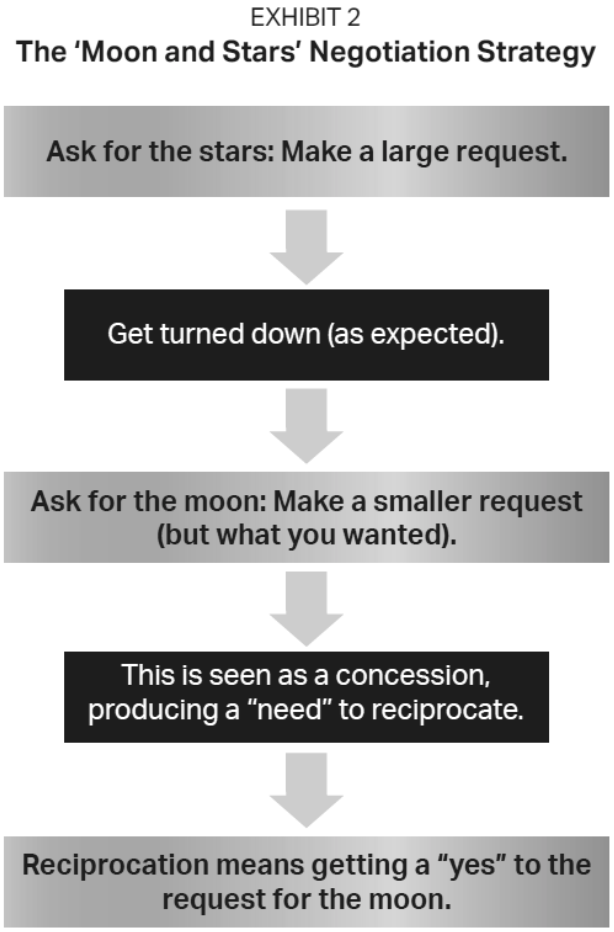Key Takeaways
- When you do something for others that they find valuable, they will feel they owe you—and (typically) will make an effort to balance the scales by bringing value to your life in some manner.
- The Super Rich regularly evaluate situations and look for ways to help the people involved. If they see a way, they take it upon themselves to offer solutions without being asked to do so.
- Starting negotiations by asking for outcomes that are much bigger than the ones you actually want can be a great way to reach your goals.

Although you may not realize it, there’s a pretty good chance that you’re preventing yourself from maximizing your success—personally and professionally—and fully living a life of significance.
The surprising culprit that could be holding you back: not doing enough for the people
around you.
That’s not to say you’re self-centered. Most of us make a point to help others in our lives
regularly. What we mean is that you might not be fully leveraging the ability to add value to people in a deliberate way that strongly encourages them to do the same for you—and, as a result, you might not be achieving your full potential.
The good news: There’s a strategy that can help you realize that potential. It’s one that we see the Super Rich—those with $500 million or more in net worth—use systematically, and we think it’s a big part of why they’re so successful.
It’s called a reciprocity mindset, and it can be harnessed to help you get what you want
consistently over time. Here’s a look at how to do it.
The ‘law’ of reciprocity
What happens when someone does you a favor? You feel grateful, of course—but you also naturally feel you owe that person something in return. You feel obligated to “pay it back” by returning the favor and responding in kind.
Likewise, when you do something for others that they find valuable, they will feel they owe you—and (typically) will make an effort to balance the scales by bringing value to your life in some manner.
This is known as the law of reciprocity. Of course, it’s more a guideline than a law. It’s likely that people will return favors you give—but there’s no guarantee.
That said, reciprocity is a norm in our culture—so much so that it feels like a rule. One reason is because reciprocity helps build a sense of interconnectedness; it’s instrumental to social evolution. People are able to provide resources without having to just give them away— promoting sharing and the division of labor. The law of reciprocity is in evidence throughout society. For example:
Free samples at department stores are intended to introduce people to a product—and motivate these same people to buy the product in response to the free gift.
People often donate to politicians because they believe they can ask those politicians to implement certain policies if elected.
The societal benefits of the law of reciprocity are such that people develop a sense of obligation to others for their beneficial actions. Consequently, there are both internal pressures (such as anxiety) and external pressures (such as shame) that drive people to give back. For example, people who fail to give back can be ostracized and labeled as freeloaders or takers.
Ultimately, then, the law of reciprocity is a powerful way to get a “yes” response from someone and to influence them with the aim of boosting the probability that you will get the results you are looking for.

Lead the charge
The law of reciprocity not only results in an obligation to repay actions that add value. It also creates an obligation to receive. Unrequested favors with good results can produce a sense of indebtedness. Many of the self-made Super Rich understand this and use it to their advantage.
Example: The Super Rich regularly evaluate situations and look for ways to help the people involved. If they see a way, they take it upon themselves to offer solutions without being asked to do so. When these solutions produce positive outcomes, the people who benefited from the Super Rich’s generosity now owe them a favor.
Of course, some people who do this often are simply being completely altruistic. And
there’s no guarantee that voluntarily helping someone will get you a benefit down the road. Nevertheless, leading the charge with the law of reciprocity can make it more likely that you will receive a much-needed favor at some point that helps you get closer to your objectives.
Applying the law of reciprocity: negotiations
One area where the affluent often leverage the law of reciprocity is during negotiations— usually in professional situations, but also in personal interactions that require some level of deal-making. That’s because it not only helps cement relationships but also promotes compromise by encouraging reciprocal concessions when bargaining.


The starting point is knowing what you really want to get out of the negotiation—your true goals. Think of this as the moon. But instead of asking for the moon, the Super Rich will often ask for the stars—that is, much bigger goals and outcomes that they are seeking and that they don’t actually expect to get.
Typically, though not always, the other person or persons involved in the negotiation say no to the request for the stars—as expected. At this point, it’s time to make a concession and dial back the outsize request—with the belief that the other party in the negotiation will react by making a reciprocal concession. This is when it’s time to ask for the moon—the goal you really seek.
The reason: The other party involved now sees this request for “just” the moon as a major
concession and is therefore inclined to reciprocate—ultimately giving the Super Rich party his or her intended outcome.
The power of this moon and stars strategy is enhanced if you can show the contrast
between the two requests. A smaller ask (the moon) can be made to look even smaller and less consequential when compared with the larger ask (the stars). By showing contrast, you highlight the concessions you make—which, in turn, can intensify the other person’s sense of obligation to also make a concession.
Some tips for successfully using this moon and stars strategy:
- Clearly know what you want to achieve (i.e., the moon). These are your minimally acceptable goals. If you get these goals in the bargain, you will consider the negotiation a success.
- Understand your wish list (i.e., the stars). These are your goals if everything went exactly your way. Your wish list is your fantasy and, as such, unlikely to happen.
- That said, the stars you ask for have to be somewhat realistic; otherwise they are dismissed out of hand—and the other people won’t feel much, if any, pressure to obey the law of reciprocity.
- Forcefully ask for the moon. In making the smaller ask, it can be useful to show the contrast. Many times, the other party will not be fully aware of the extent of the difference.
Therefore, it is usually worthwhile to connect all the dots for that person. You accomplish
this by specifically pointing out just what, and how much, you are giving up. You want to
emphasize that you are making some big concessions and believe it is only fair that the
other party also make some concessions, which entails saying yes to the moon.
Bonus: By making concessions, you come across as reasonable, flexible and someone who can be worked with. This is a great message to send if you ever need to deal with that person again.
Conclusion
In many situations involving negotiating, haggling or other types of back-and-forth, a
reciprocity mindset has helped fuel the success of many millionaires and billionaires.
Understanding and leveraging the law of reciprocity can allow you to achieve big goals you set for yourself and cut advantageous deals that can help you build wealth and live a life of significance.


0 Comments